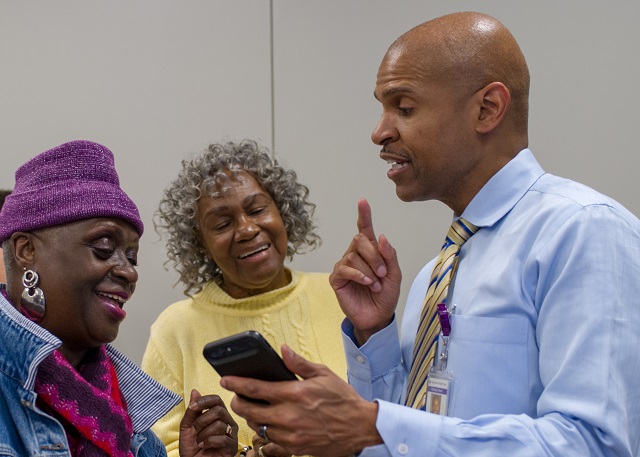Advocate Aurora Health is committed to helping all people live well, by closing the gaps and disparities that our patients and communities are facing. For Advocate Trinity Hospital, located on the South Side of Chicago, leaders are focused on building equity, ensuring access and improving health outcomes through evidence-informed services and innovative partnerships.
As one-third of the hospital’s physicians, nurses, pharmacists and team members reside in the surrounding community, leaders say that personal connections lead to stronger relationships with patients and ultimately better health outcomes.
“Because so many of us have lived or worked in communities like the South Side, we understand why Advocate Trinity’s community health strategy must include ways to help people address social barriers that impact the ability to feel safe and secure,” says Jackie Rouse, DrPH, vice president of Illinois community health for Advocate Aurora Health. “It’s difficult to think about health care when you don’t have enough to eat or are underemployed or are living in an unsafe environment.”
Armed with the understanding that the South Side of Chicago disproportionately experiences high rates of diabetes, stroke and cardiovascular disease, as well as higher death rates related to childbirth, COVID-19 and cancer, the hospital offers several programs that are successfully improving outcomes and closing the health disparity gap, such as:
- Community Baby Showers host moms-to-be for an afternoon of breastfeeding education, gifts, food and games. This program is offered in partnership with Dr. Dakisha Lewis, an obstetrics and gynecology physician and medical director of OB-GYN services at Advocate Trinity and SGA Youth and Family Services and other local partners.
- Food Farmacy provides fresh, healthy food for food-insecure patients. Advocate Trinity’s physicians enroll patients in need to the program. This successful program recently launched a second site at Advocate South Suburban Hospital in Hazel Crest, IL. Between the two sites, the program has distributed more than 50,000 pounds of food this year to patients who have visited nearly 2,000 times, thanks to a partnership with the Ackermann Foundation and Michuda Construction.
- Love Your Heart blood pressure control program offers patients with hypertension blood pressure cuffs, training and physician check-ups. Patients learn how to self-monitor their blood pressure, gain access to fresh and healthy food and have opportunities to attend monthly lectures and health-focused activities. Thanks to a partnership with the American Heart Association, 500 blood pressure cuffs will be donated to help patients better manage their hypertension.
- Mobile COVID-19 vaccination program through the City of Chicago’s Project Chicago at Home, partners with Advocate Trinity nurses who administered more than 5,370 COVID-19 vaccinations to residents in their homes and at pop-up vaccine clinics hosted at neighborhood and community events.
Advocate Trinity Hospital is just one example of how Advocate Aurora Health’s equity strategy is being brought to life through equitable access to care, treatment and health outcomes across the communities it serves, including its team members who are the backbone of the organization. By focusing on areas that enable health inequalities, the goal is to close the gap around:
- Access to primary medical services
- Community Safety
- Access to behavioral health services
- Housing
- Workforce Development
- Food Safety
Through the generous support of our donors and community partners, Advocate Aurora Health can continue to meet the needs of our patients and ensure everyone has a path to great health outcomes.
How you can help
Advocate Aurora Health is a not-for-profit organization that relies on philanthropy to enhance care, enable innovation and provide extra measures of comfort for patients battling illness and recovering from injuries. There are many ways you can support these initiatives in your community. Get started here.
